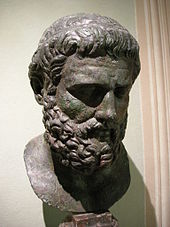401 BC Chr.
Portal history | Portal Biographies | Current events | Annual calendar
◄ |
6th century BC Chr. |
5th century BC Chr. |
4th century BC Chr. |
►
◄ | 420 BC Chr. | 410 BC Chr. | 400s BC Chr. | 390 BC Chr. |
380s BC Chr. |
►
◄◄ | ◄ | 404 BC Chr. | 403 BC Chr. | 402 BC Chr. | 401 BC Chr. |
400 BC Chr. |
399 BC Chr. |
398 BC Chr. |
► |
►►
| 401 BC Chr. | |
|---|---|
| After the battle of Kunaxa , Greek mercenaries take the train of the ten thousand . | |
| 401 BC In other calendars | |
| Buddhist calendar | 143/144 (southern Buddhism); 142/143 (alternative calculation according to Buddha's Parinirvana ) |
| Chinese calendar | 38th (39th) cycle , year of the metal dragon庚辰 ( at the beginning of the year earth-rabbit 己卯) |
| Greek calendar | 3rd / 4th Year of the 94th Olympiad |
| Jewish calendar | 3360/61 |
| Roman calendar | from urbe condita CCCLIII (353) |
Events
Politics and world events
Persian Empire
Due to the poor performance of Artaxerxes II in the struggle against Egypt's aspirations for freedom , but above all because of his own ambitions, his younger brother Cyrus the Younger wants to take over the government of the Achaemenid Empire . With the support of Sparta , whose partisan he was in the Peloponnesian War , he wins an impressive army of Greek mercenaries. The decisive battle at Kunaxa is fought in autumn a little above Babylon on the Euphrates between the armies of the two brothers.
Cyrus wins, but falls in the battle, which makes the task of his mercenary army obsolete. Under the leadership of the Athenian Xenophon and the Spartan Cheirisophos , the so-called procession of ten thousand made its way through the entire Persian Empire and in the following year reached the southern coast of the Black Sea, which was occupied by Greek cities .
Italy
Marcus Furius Camillus is the first Roman consular tribune and fights in this position against the Etruscan cities of Veio and Tarquinia and the allied Falisker in Falerii , who oppose the expansionist efforts of Rome.
Culture
The drama Oedipus auf Kolonos by Sophocles is performed for the first time posthumously. As part of the “Theban Trilogy”, it stands between the dramas King Oedipus and Antigone , but is only performed as the last of the three parts.
Born
Died
- Klearchos , Spartan fleet leader
- Cyrus the Younger , Persian Prince
- Proxenus of Thebes , Greek military leader (* 431 BC )

